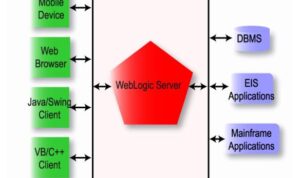Embark on a journey through the realm of cloud server providers, where innovation meets practicality and businesses thrive in the digital age. Discover the top players in the industry, unravel the key features that set them apart, and unlock the benefits awaiting those who harness the power of cloud technology.
As we delve deeper into the intricacies of cloud server providers, a world of possibilities unfolds, offering businesses a competitive edge like never before.
Overview of Cloud Server Providers
Cloud server providers offer businesses the ability to store, manage, and access their data and applications securely on remote servers. This eliminates the need for physical servers and provides scalability, flexibility, and cost-efficiency. Here are some of the top cloud server providers in the industry and the key features they offer:
Top Cloud Server Providers
- Amazon Web Services (AWS): AWS is one of the largest cloud service providers, offering a wide range of services such as computing power, storage, and databases.
- Microsoft Azure: Azure provides cloud services for building, deploying, and managing applications through Microsoft's global network of data centers.
- Google Cloud Platform (GCP): GCP offers infrastructure, platform, and software services for businesses to innovate and scale.
- IBM Cloud: IBM Cloud provides a full-stack cloud platform that spans public, private, and hybrid environments.
- Oracle Cloud: Oracle Cloud offers a comprehensive suite of integrated applications, platform, and infrastructure services.
Key Features of Cloud Server Providers
- Scalability: Cloud server providers allow businesses to easily scale their resources up or down based on demand.
- Flexibility: Businesses have the flexibility to choose the services and resources they need without being tied to physical hardware.
- Security: Cloud server providers offer advanced security measures to protect data from unauthorized access and cyber threats.
- Cost-Efficiency: Businesses can reduce costs by only paying for the resources they use, rather than investing in and maintaining physical servers.
Benefits of Using Cloud Server Providers for Businesses
- Increased Efficiency: Cloud server providers enable businesses to quickly deploy applications and scale resources, increasing operational efficiency.
- Improved Collaboration: Cloud services facilitate collaboration among teams by providing a centralized platform for data and applications.
- Disaster Recovery: Cloud server providers offer backup and disaster recovery solutions to ensure business continuity in case of data loss or system failures.
- Global Reach: Businesses can access cloud services from anywhere in the world, enabling global expansion and reach.
Pricing Models
When it comes to cloud server providers, pricing models play a crucial role in the decision-making process for businesses and individuals looking to utilize cloud services. Understanding the pricing structures offered by different providers can help users make informed choices based on their specific needs and budget constraints.
Comparison of Pricing Models
- Pay-As-You-Go: This model charges users based on the resources they consume, such as storage, bandwidth, and compute power. Users only pay for what they use, making it a flexible option for businesses with fluctuating demands.
- Reserved Instances: Providers offer discounts for users who commit to a specific amount of resources over a set period. This model is ideal for businesses with predictable workloads looking to save costs in the long run.
- Spot Instances: Users bid on unused cloud capacity, allowing them to access resources at a lower price. However, availability is not guaranteed, making it suitable for non-time-sensitive workloads.
Impact on Provider Selection
- Pricing structures can significantly impact the choice of a cloud server provider based on the user's workload requirements, budget constraints, and long-term goals.
- Businesses with unpredictable workloads may benefit from a pay-as-you-go model, while those with stable demands might opt for reserved instances to save costs.
- Understanding how each pricing model aligns with the user's specific needs is essential to selecting the most cost-effective option.
Hidden Costs to Consider
- Data Transfer Fees: Some providers charge additional fees for data transfer between regions or outside the network, which can significantly impact overall costs.
- Storage Costs: Users should be aware of any charges related to data storage, especially if they anticipate scaling up their storage requirements over time.
- Support Fees: Certain providers may charge extra for premium support services, so users should consider these costs when evaluating different options.
Performance and Reliability
When considering cloud server providers, performance and reliability are crucial factors to evaluate. The metrics provided by these providers can give insights into how well their services meet your needs, while uptime and downtime statistics can indicate the overall reliability of their infrastructure.
Performance Metrics
- Response time: Measure of how quickly the server responds to requests, indicating the speed of data retrieval and processing.
- Bandwidth: Amount of data that can be transferred between the server and users, affecting the speed and reliability of network connections.
- Scalability: Ability of the server to handle increasing workloads without compromising performance, ensuring flexibility and efficiency.
Reliability and Uptime
Cloud server providers often guarantee a certain level of uptime, indicating the percentage of time their services are accessible without interruptions. Downtime, on the other hand, refers to periods when services are unavailable due to maintenance, upgrades, or technical issues.
Evaluating the reliability of a provider involves examining their uptime history, response to outages, and disaster recovery plans.
Evaluating Performance and Reliability
To assess the performance and reliability of a cloud server provider, consider factors such as service level agreements (SLAs), customer reviews, and independent performance benchmarks. Look for providers with a track record of high uptime, low latency, and strong network infrastructure.
Testing the services through trial periods or pilot projects can also help determine if the provider meets your performance and reliability requirements.
Security Features
Data security is a crucial aspect to consider when choosing a cloud server provider. Different providers offer various security features to protect data from unauthorized access, breaches, and other cyber threats. Let's explore some of the key security features provided by cloud server providers and their importance in ensuring the safety of your data.
Encryption
One of the fundamental security features offered by cloud server providers is encryption. Encryption ensures that data is converted into a code that can only be accessed with the appropriate decryption key. This helps protect sensitive information from being intercepted or compromised during transmission or storage.
Firewalls and Intrusion Detection Systems
Cloud server providers often incorporate firewalls and intrusion detection systems to monitor and filter incoming and outgoing network traffic. Firewalls act as a barrier between the server and external networks, preventing unauthorized access, while intrusion detection systems alert administrators to suspicious activities that may indicate a potential security threat.
Multi-Factor Authentication
Another essential security feature is multi-factor authentication (MFA), which requires users to provide multiple forms of verification before accessing the cloud server. This additional layer of security helps prevent unauthorized access even if login credentials are compromised.
Regular Security Updates and Patch Management
Cloud server providers regularly update their security measures and apply patches to fix vulnerabilities in their systems. These updates help ensure that the server is protected against the latest threats and that any potential security gaps are addressed promptly.
Data Backup and Disaster Recovery
In the event of data loss or a security breach, having robust data backup and disaster recovery mechanisms in place is crucial. Cloud server providers often offer automated backups and recovery options to help restore data quickly and minimize downtime in case of emergencies.
Compliance Certifications
Many cloud server providers adhere to industry-specific compliance standards and certifications to ensure that data security and privacy regulations are met. Compliance certifications such as ISO 27001, HIPAA, and GDPR demonstrate a provider's commitment to maintaining high security standards and protecting customer data.
Importance of Security Features
The importance of security features provided by cloud server providers cannot be overstated. Data breaches and cyber attacks can have severe consequences for businesses, including financial losses, reputational damage, and legal implications. By choosing a provider that offers robust security measures, businesses can safeguard their valuable data and minimize the risk of security incidents.
Meeting Varying Business Needs
Different businesses have unique security requirements based on their industry, size, and regulatory obligations. Cloud server providers offer a range of security features that can be tailored to meet varying business needs. Whether it's encryption for sensitive data, compliance certifications for regulatory requirements, or disaster recovery options for business continuity, providers can customize their security offerings to align with specific business objectives.
Scalability and Flexibility
Scalability and flexibility are crucial aspects when choosing a cloud server provider as they directly impact the growth and operations of a business. Let's delve into the options available and how they can benefit businesses.
Scalability Options
Different cloud server providers offer various scalability options to meet the changing needs of businesses. Some common scalability options include:
- Vertical Scaling: This involves increasing the resources of a single server, such as CPU, RAM, or storage, to handle increased workload.
- Horizontal Scaling: This involves adding more servers to distribute the workload and enhance performance as the demand grows.
- Auto-Scaling: This feature automatically adjusts resources based on predefined conditions, ensuring optimal performance and cost-efficiency.
Flexibility in Resource Allocation
Flexibility in resource allocation allows businesses to adjust their resources according to their needs, ensuring efficient utilization and cost-effectiveness. Some benefits include:
- Pay-Per-Use Model: Businesses can pay for the resources they actually use, avoiding over-provisioning and reducing costs.
- On-Demand Resources: Businesses can quickly scale up or down based on demand, ensuring optimal performance during peak times.
- Custom Resource Allocation: Providers offer the flexibility to customize resource allocation based on specific requirements, allowing businesses to optimize their operations.
Impact on Business Growth
Scalability and flexibility play a vital role in the growth of a business using cloud server providers. For example:
- A startup can easily scale its resources as it grows without the need for significant upfront investment, enabling rapid expansion.
- An e-commerce business can seamlessly handle spikes in traffic during sales events by leveraging auto-scaling capabilities, ensuring a smooth shopping experience for customers.
- A seasonal business can adjust its resources based on demand fluctuations, optimizing costs and performance throughout the year.
Final Summary
In conclusion, cloud server providers revolutionize the way businesses operate, paving the path for scalability, security, and efficiency. Embrace the future of technology with confidence and soar to new heights in the digital landscape.
User Queries
How do I choose the right cloud server provider for my business?
Consider factors like scalability, security features, and pricing models to align with your business needs.
Are there any hidden costs associated with cloud server providers?
Some providers may have additional charges for data transfer or storage exceeding limits. It's important to review the terms carefully.
What impact does performance have on choosing a cloud server provider?
Performance metrics like uptime, response time, and reliability are crucial in ensuring seamless operations for your business.
How can scalability benefit businesses using cloud server providers?
Scalability allows businesses to adjust resources based on demand, ensuring efficient operations and cost-effectiveness.
What security features should I look for when selecting a cloud server provider?
Look for features like encryption, firewalls, access controls, and regular security updates to safeguard your data.







